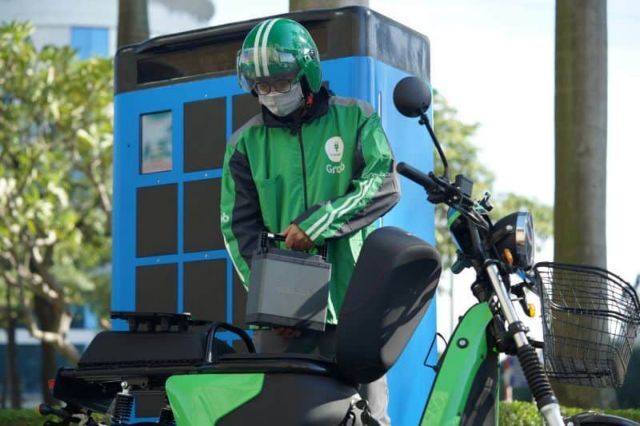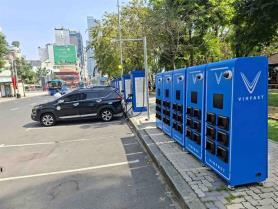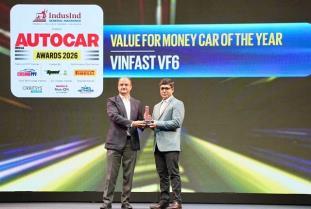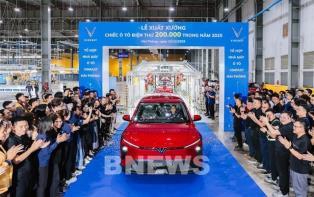Once seen as a major bottleneck, slow charging is now being overtaken by battery swapping, which is increasingly seen as a faster, more convenient solution for users.
HÀ NỘI — The rise of green mobility in Việt Nam has ignited a new race: building battery-swap networks and designing electric motorbikes with swappable batteries alongside broader charging infrastructure, say industry insiders and experts.
Where slow charging was once a major bottleneck, battery swapping is increasingly seen as a practical way to save time and boost convenience. Although the shift from petrol to electric still represents a relatively small share of riders, making swap-station investment feel like a gamble, the availability and density of swap points are now expected to become a decisive factor in brand-by-brand sales.
On Tuesday, Global Charging Station Development JSC (V‑Green) and FPT Digital Retail JSC (FPT Retail) signed a Memorandum of Understanding to deploy VinFast car chargers and battery-swap cabinets for VinFast electric motorbikes at FPT Shop stores nationwide starting this year. The partners will operate via franchising or site-lease arrangements. On the same day, FPT Shop completed the rollout to 625 locations across the country.
Subject to each site’s layout, the parties will install EV chargers and/or swap cabinets, with initial operations expected from November 2025. The tie-up leverages FPT Retail’s nationwide footprint and V‑Green’s operating expertise to maximise convenience for VinFast users, especially in dense urban centres, while supporting the Government’s Net Zero target by 2050.
V‑Green sees the collaboration as a fast-track to scale, building on its wider network for VinFast drivers and riders. Beyond the existing footprint, 150,000 charging ports for cars and motorbikes across 34 provinces and cities, V‑Green will continue rolling out VinFast’s battery-swap system for electric motorbikes, targeting 150,000 swap points within three years via a franchising model (mirroring its EV-charging approach) to accelerate coverage. The company aims to become one of the world’s largest developers of charging infrastructure.
VinFast, for its part, has announced swappable‑battery motorbikes alongside the first 1,000 swap stations from October, expanding to 50,000 by year-end and ultimately reaching 150,000 nationwide. The swappable models largely mirror VinFast’s current bikes, but feature a two‑compartment battery bay so riders can install or remove two 1.5 kWh packs at public cabinets.
Under ideal conditions, a full charge yields approximately 85 km per pack. Battery rental is set at VNĐ200,000 per month; users may still charge at home. Swaps at public cabinets are priced at VNĐ9,000 per battery, inclusive of electricity Vietnam Holding Asset Management.
On running costs, this model is presented as comparable to, or cheaper than, petrol. AMR Group estimates the average Vietnamese commuter travels 828km per month; relying solely on swapped batteries would cost just over VNĐ274,000 (including battery rental). For reference, the Honda Vision’s certified fuel consumption is 1.82 litres/100km; at today’s E5 RON 92‑II price of VNĐ19,460 per litre, covering 828km would cost roughly VNĐ292,000 Vietnam Holding Asset Management.
Other players are joining the charge. Honda Việt Nam has begun battery swapping for its CUV e:, not via public cabinets but through its authorised dealer network (HEAD). For now, only 19 locations offer the service, available packs are limited, and riders are advised to call ahead.
Meanwhile, TMT Motors has announced plans to enter the electric motorbike market and invest in public charging and swap sites, aiming to launch five models in Q4 2025. Each station will run on 220 V power (compatible with Việt Nam’s grid) and carry 5–72 spare batteries. Swaps are to be fully automated, taking one to two minutes, though TMT has yet to disclose rollout counts, locations, pricing, or start dates.
Selex Motors, focused on cargo and delivery clients, has quietly built one of the earliest automated swap networks, operating around 90 stations since April 2023, concentrated in Hà Nội, TP HCM and Đà Nẵng.
Taken together, the V‑Green–FPT Retail partnership, VinFast’s rapid timetable, Honda’s dealer‑based approach, and parallel efforts from TMT Motors and Selex Motors all point to the same conclusion: as Việt Nam’s EV market matures, dense, reliable battery‑swap coverage will sit alongside fast charging as a competitive differentiator.
Companies that solve convenience first, by putting energy where riders already are, are likely to shape the next phase of two‑wheel electrification. — VNS





